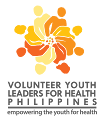Health Promotion and Advocacy Working Group
World Prematurity Day Primer
The Official Publication of Volunteer Youth Leaders for Health - Philippines

VYLH-Philippines is a network of pro-active, service-oriented youth leaders and youth organizations linked by the common interest of volunteerism and public service, to improve birth outcomes through advocacy.

VYLH-Philippines is a network of pro-active, service-oriented youth leaders and youth organizations linked by the common interest of volunteerism and public service, to improve birth outcomes through advocacy.

VYLH-Philippines is a network of pro-active, service-oriented youth leaders and youth organizations linked by the common interest of volunteerism and public service, to improve birth outcomes through advocacy.

VYLH-Philippines is a network of pro-active, service-oriented youth leaders and youth organizations linked by the common interest of volunteerism and public service, to improve birth outcomes through advocacy.

VYLH-Philippines is a network of pro-active, service-oriented youth leaders and youth organizations linked by the common interest of volunteerism and public service, to improve birth outcomes through advocacy.
 |
| Reunion of Saved Babies Visayas |
 |
| Reunion of Saved Babies NCR-South Luzon |

